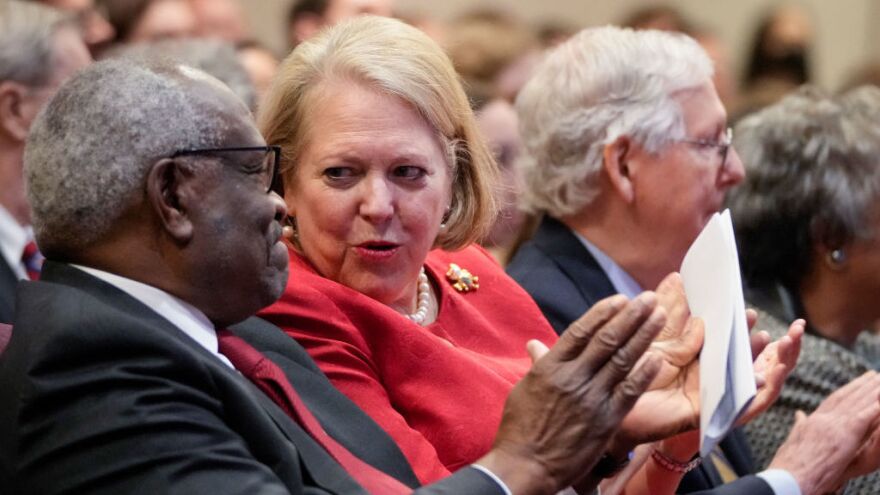Updated March 25, 2022 at 9:31 AM ET
The wife of Supreme Court Justice Clarence Thomas reportedly urged President Donald Trump's top aide to make efforts to overturn the results of the 2020 presidential election.
CBS and The Washington Post report that toward the end of the Trump administration, Ginni Thomas exchanged text messages over several weeks with Mark Meadows, who was the White House chief of staff at the time.
The text messages were among those turned over by Meadows to the House committee investigating the Jan. 6, 2021, attack on the U.S. Capitol. He later stopped cooperating with the panel.
There are suggestions in these messages that Ginni Thomas may have had contacts with others in the White House and on Trump's legal team.
Robert Costa, CBS News' chief election and campaign correspondent, told NPR that Ginni Thomas reached out to Meadows days after the election, when "President Trump was already eyeing a potential hearing at the U.S. Supreme Court."
"It was the beginning of a 29 text-message exchange between November 2020 and January 2021," Costa said. NPR has not independently confirmed the reporting.
It is not the first time Ginni Thomas has been the center of controversy.
This month, Ginni Thomas tried to rebut claims that there's a conflict of interest between her conservative activism and her husband's work on the highest court. In an interview with the conservative website The Washington Free Beacon, she said that while she did attend the Jan. 6 rally that preceded the violence at the Capitol, she left before Trump spoke at noon and before the rioters breached the Capitol complex.
It is unclear whether Thomas was aware of his wife's correspondence with Meadows, but in February 2021, a month after Joe Biden was sworn in as president, the Supreme Court refused to hear election challenges brought by Trump and his allies, and Thomas wrote a blistering dissent saying that the court should have heard the case to ensure the rules of the road were clear next time.
The text messages raise ethical questions about whether Clarence Thomas should have recused himself last year in cases pertaining to the election and whether he should in the future. New York University law professor Stephen Gillers, author of leading texts on legal ethics, tells NPR that the newly disclosed texts have changed his mind on these questions.
"By reaching out to Mark Meadows and possibly others, [she] became part of the Stop the Steal team," he said. "That team's strategy included eventual appeals, if necessary to the Supreme Court."
Even if Clarence Thomas didn't know what his wife was doing, Gillers maintains, these texts indicate he would have had to willfully ignore her conduct, and in any event, he certainly knows now.
Read below for more highlights of NPR's interview with Costa and what the text messages reveal.
Interview highlights
On how the texts show relationships across different branches of the U.S. government
It's extraordinary. This is a pipeline between the spouse of a Supreme Court justice and the chief of staff at the White House, one of the top executives and officials in the executive branch, and they're communicating at times about the legislative branch — Congress. It's this overlapping of relationships across the United States government, and they all have seemingly one mission — to overturn the 2020 election to stop Joe Biden from taking the White House — and at times, they are communicating about legal strategy.
On whether Ginni Thomas referenced her husband in the texts
It's important to note that the Supreme Court and Justice Thomas ... are never referenced in a way that is clear. And we've reached out to Justice Thomas and Ginni Thomas repeatedly for some kind of clarification. They have so far not responded.
But what we do see is a reference in the text messages from Ginni Thomas to a best friend. She does not say whom she is referring to in that. Public documents and speeches show that Ginni Thomas and Clarence — the Supreme Court justice — have both referred to each other as "best friend" in the past. But again, we do not know exactly who she is referring to. She also mentions his 1991 confirmation hearings at one point.
On how Meadows reacted to Ginni Thomas' messages
There are times he seems to seriously embrace her message. At one point, he invokes his faith, talks about God, the "King of Kings" and how this is not just an election fight. He frames it as a fight of good vs. evil.
On the possible conflicts of interest in a Supreme Court justice's wife communicating with the White House chief of staff to overturn a presidential election
We do not know yet was there any awareness about Ginni Thomas' message[s] to Mark Meadows. Were they part of that trove at the time? Was there any awareness that her messages were part of the documents going over to the committee, a decision he was ruling on? So in brief, was he ruling on something that his wife was involved in?
And the bigger picture is he ruled on several Trump-related cases. He was part of decisions about throwing out some of the election cases, but he said, in his own writing, [that] those cases should be heard.
On possible consequences for Clarence Thomas
Supreme Court justices ... don't have much oversight other than Congress. They can be impeached, but there's no sort of oversight board or rulebook for Supreme Court justices, so a lot of this is going to come down to what Congress decides to do, if anything.
Copyright 2023 NPR. To see more, visit https://www.npr.org.





